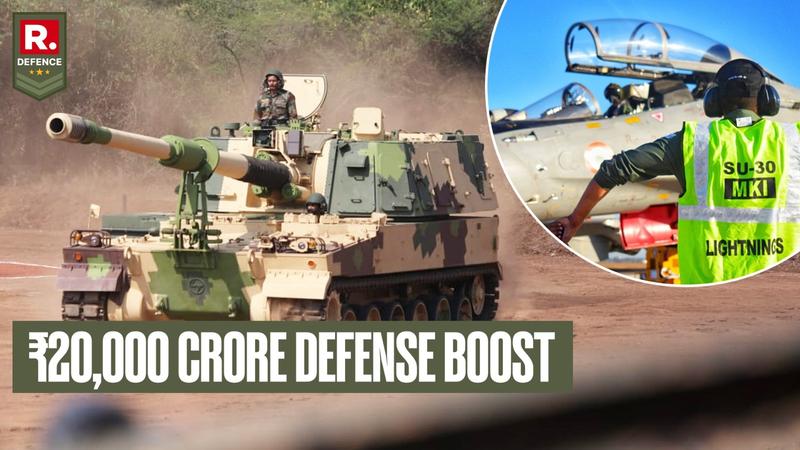Published 12:42 IST, December 14th 2024
₹13,500 Crore Contract Signed for 12 Su-30MKI Jets and 100 K-9 Vajra Howitzers
The MoD has signed two significant contracts worth ₹13,500 crore to procure 12 Su-30MKI fighter aircraft and 100 K-9 Vajra self-propelled howitzer.

New Delhi, India – In a significant move to enhance indigenous defence capabilities under the Aatmanirbhar Bharat initiative, the Ministry of Defence signed two major contracts for the procurement of 12 Su-30MKI fighter aircraft and 100 K-9 Vajra self-propelled howitzers. These contracts, valued at approximately ₹13,500 crore and benefiting the domestic defence manufacturing ecosystem, are set to bolster India’s operational readiness and defence self-reliance.
The first contract, signed between the Ministry of Defence and Hindustan Aeronautics Limited (HAL), involves the procurement of 12 Su-30MKI aircraft. These advanced multi-role fighter jets, equipped with state-of-the-art avionics and weaponry, are a critical addition to the Indian Air Force’s (IAF) fleet.
Su-30MKI Contract: A Step Towards Indigenous Excellence
With a 62.6% indigenous content, the aircraft reflects India’s growing capability to produce sophisticated defence equipment. The indigenisation includes components manufactured by Indian defence firms, further boosting domestic industry.

The aircraft will be produced at HAL’s Nasik division, a hub for fighter aircraft assembly and maintenance. The Su-30MKIs will augment the IAF’s combat and reconnaissance capabilities, ensuring India’s preparedness for modern warfare. The Ministry of Defence emphasized that the contract aligns with India’s vision of becoming a global hub for defence manufacturing and will create numerous job opportunities across the supply chain.
K-9 Vajra: A Repeat Order of Proven Firepower
The second contract pertains to the acquisition of 100 K-9 Vajra self-propelled howitzers, to be manufactured by Larsen & Toubro (L&T) at its Hazira facility in Gujarat. This order follows the successful delivery of an earlier batch of 100 howitzers, inducted into the Indian Army between 2018 and 2021.
The K-9 Vajra is a 155 mm, 52-caliber tracked artillery system weighing 50 tonnes and operated by a crew of five. Firepower: It can fire various types of ammunition, including high explosive (HE), smoke, and illumination shells, with a maximum range of 40 km using K307 Base Bleed HE projectiles.

Its steel turret and hull offer robust protection against 14.5 mm armor-piercing rounds and 155 mm shell fragments. With advanced features like zero-radius turning and a digital fire control system, the K-9 Vajra is designed for high mobility and rapid deployment.
The K-9 Vajra was developed through a partnership between L&T and South Korea’s Hanwha Defense, with significant technology transfer to India. The first batch of these artillery systems was delivered ahead of schedule, underscoring India’s capability to meet stringent defence timelines.
Strategic Significance of the Procurements
- Strengthening Defence Readiness: The addition of Su-30MKI fighter jets and K-9 Vajra howitzers will significantly enhance India’s air and ground combat capabilities, ensuring operational superiority in diverse terrains and conflict scenarios.
- Boosting Indigenous Manufacturing: Both contracts reflect a strong commitment to domestic defence manufacturing, with HAL and L&T playing pivotal roles. This aligns with the government’s push to reduce dependence on imports and promote Aatmanirbharta (self-reliance) in defence.
- Economic Impact: The contracts are expected to generate employment and stimulate economic growth through the involvement of numerous micro, small, and medium enterprises (MSMEs) in the supply chain.
- Technological Advancement: The projects exemplify India’s ability to adopt and indigenize cutting-edge technology, laying the groundwork for future innovations in defence equipment.
These acquisitions not only address immediate operational requirements but also signal India’s resolve to emerge as a global leader in defence production, capable of meeting domestic and international demands. With these contracts, India is not just buying weapons—it is investing in a future of strategic autonomy and sustainable defence growth.
Updated 12:42 IST, December 14th 2024




